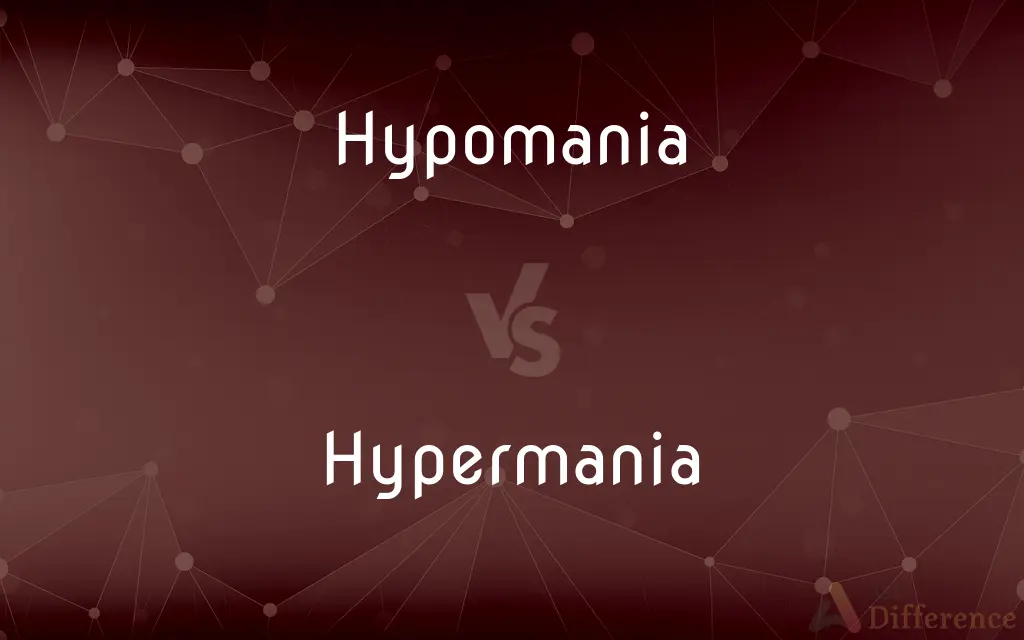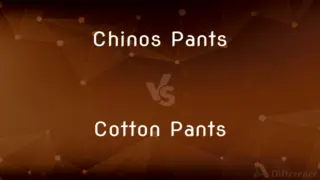Hypomania vs. Hypermania — What's the Difference?
Hypomania is a milder form of mania with less severe symptoms that don't significantly impair daily functioning, while hypermania, often referred to as severe mania, entails more intense symptoms that greatly disrupt daily life.

Difference Between Hypomania and Hypermania
Table of Contents
ADVERTISEMENT
Key Differences
Hypomania is characterized by elevated mood, increased energy, and heightened productivity that are noticeable but not severe enough to cause marked impairment in social or occupational functioning. Individuals experiencing hypomania may feel more creative, energetic, and confident, and these symptoms can be beneficial to some extent. However, they might also engage in risky behaviors without the severe consequences associated with full-blown mania.
Hypermania, a term less commonly used but understood to mean severe mania, involves more extreme symptoms such as significant sleep disturbances, irrational or risky decision-making, and potentially psychotic features like delusions or hallucinations. The intensity of hypermania significantly impairs one's ability to function in daily life, requiring immediate medical attention. This state often leads to noticeable problems in work, social relationships, and overall well-being.
Hypomania does not usually necessitate hospitalization and may go unnoticed by others as a psychiatric condition, while hypermania (severe mania) is a psychiatric emergency that can result in hospitalization to protect the individual and those around them. The distinction is crucial in the context of bipolar disorder diagnosis, treatment planning, and prognosis.
Hypomania can be a phase of bipolar II disorder, where it alternates with episodes of major depression. In contrast, hypermania is typically associated with bipolar I disorder, characterized by full manic episodes that may be preceded by or followed by hypomanic or depressive episodes. The management of hypomania often involves lifestyle adjustments and monitoring, whereas hypermania requires pharmacological intervention and possibly hospitalization.
Understanding the difference between hypomania and hypermania is essential for accurately diagnosing bipolar disorder and related conditions. It guides the treatment approach, helping healthcare providers decide on the best course of action to support the individual's mental health while minimizing the risk of progression to more severe states.
ADVERTISEMENT
Comparison Chart
Severity
Mild to moderate
Severe
Impact on Daily Life
Minimal; can be productive
Significant impairment; requires immediate attention
Symptoms
Elevated mood, increased energy, and productivity without major impairments
Extreme mood elevation, sleep disturbances, delusions, or hallucinations
Association
Often a phase of bipolar II disorder
Typically seen in bipolar I disorder
Treatment
Lifestyle adjustments, monitoring
Pharmacological intervention, hospitalization
Compare with Definitions
Hypomania
Elevated mood without severe disruption.
Feeling unusually confident and productive for several days.
Hypermania
Intense mood elevation.
Feeling invincible or on top of the world.
Hypomania
Minimal impact on social/occupational functioning.
Enhanced performance at work.
Hypermania
Possible psychotic features.
Experiencing hallucinations or delusions.
Hypomania
Often part of bipolar II disorder.
Experiencing periods of hypomania alternating with depression.
Hypermania
Severe sleep disturbances.
Going days without feeling the need to sleep.
Hypomania
Can lead to risky behaviors.
Making impulsive financial decisions.
Hypermania
Irrational decisions.
Extravagant spending sprees or unrealistic business ventures.
Hypomania
Increased creativity and energy.
Starting many new projects enthusiastically.
Hypermania
Requires immediate medical attention.
Hospitalization to prevent harm.
Hypomania
(medicine) A mild form of mania, especially the phase of several mood disorders characterized by euphoria or hyperactivity.
Hypermania
An extreme form of mania.
Common Curiosities
Why is it important to distinguish between hypomania and hypermania?
The distinction guides treatment decisions, helps predict the course of the illness, and informs the prognosis.
Can someone with hypomania develop hypermania?
Yes, individuals with bipolar disorder may experience a progression from hypomania to hypermania, especially if untreated.
How are hypomania and hypermania diagnosed?
Diagnosis is based on clinical observation, patient history, and symptom severity over time, often using criteria from the DSM-5.
What are the risks of untreated hypermania?
Untreated hypermania can lead to severe personal, financial, and social consequences, including the risk of suicide.
What are the treatment options for hypomania?
Treatment may include lifestyle changes, psychotherapy, and sometimes medication to stabilize mood without dampening the beneficial aspects of increased energy.
How long do hypomanic and manic episodes last?
Hypomanic episodes must last at least four days, while manic episodes last at least a week or require hospitalization.
Is hospitalization always necessary for hypermania?
Not always, but it is common due to the high risk of harm to oneself or others and the need for rapid, intensive treatment.
Can hypomania be beneficial?
Some individuals may find their hypomanic episodes lead to increased productivity and creativity, though it still carries risks.
Can hypomania and hypermania be experienced outside of bipolar disorder?
While rare, hypomanic-like or manic-like symptoms can occur in other conditions or as reactions to certain medications, but true hypomania and hypermania are primarily associated with bipolar disorder.
What causes hypomania and hypermania?
Both conditions are typically part of bipolar disorder, influenced by genetic, biochemical, and environmental factors.
What are common triggers for hypomanic and hypermanic episodes?
Stress, lack of sleep, substance abuse, and changes in medication can trigger both hypomanic and hypermanic episodes in individuals with bipolar disorder.
Can medication prevent hypermania?
Mood stabilizers and antipsychotic medications can help prevent manic episodes and stabilize mood swings.
How do family and friends typically respond to hypomanic vs. hypermanic episodes?
Family and friends might not recognize hypomania as a problem due to its less disruptive symptoms, often perceiving the individual as merely lively or productive. In contrast, hypermania's severe symptoms are more likely to prompt concern and the seeking of medical help due to its obvious impact on the individual's behavior and decision-making.
How does the approach to medication differ between treating hypomania and hypermania?
In hypomania, medication may be used cautiously to avoid overcorrection and maintain the individual's quality of life. The focus is on mood stabilizers that prevent escalation to mania. For hypermania, more aggressive pharmacological intervention is often required, including higher doses of mood stabilizers and the use of antipsychotic medications to quickly reduce symptoms.
What role does psychotherapy play in managing hypomania and hypermania?
Psychotherapy, including cognitive behavioral therapy (CBT) and family-focused therapy, can be effective in managing both conditions. It helps individuals recognize early signs of mood shifts, develop coping strategies, and maintain medication adherence, thus potentially preventing severe episodes.
What lifestyle adjustments can help manage hypomania and prevent hypermania?
Regular sleep patterns, stress reduction techniques, avoiding alcohol and substance abuse, and maintaining a consistent routine can help manage hypomania and reduce the risk of escalation to hypermania.
Share Your Discovery

Previous Comparison
Chinos Pants vs. Cotton Pants
Next Comparison
Google Fi vs. T-Mobile













































